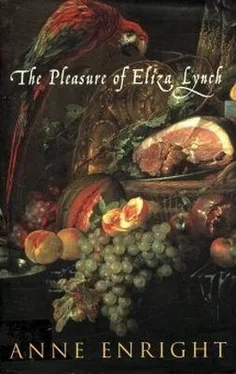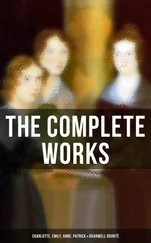Fifteen:
Pop! Nothing.
Sixteen:
A blank.
Seventeen:
Nothing. Nothing. Nothing.
Eighteen:
Everything.
Nineteen:
Everything!
Twenty:
And a little bit… more.
Usually at this point, the man would roll off and look for his boots, but they stayed and stroked each other. He fingered her necklace – perhaps it was this had made him pause. She ran her hands along the flesh of his back – so neatly packed. She started to laugh. They had surprised themselves. He reached down by the bedside, and hauled up a bottle of slightly flat champagne.
'My father,' he began. He talked about Paraguay, the country that no one had ever heard of, a railway line he would build, tick tack snicketty snack across her stomach and between her breasts, until bumph it hit her nose.
In London, he told her, he had mounted his first train. Thirty-nine advisors, one hundred and three trunks, and return tickets to Brighton. What a young fool he was. Outside the window, the city did not stop. Valera, his equerry, would not take the hat off his lap, his knees prissily together, the words stalled in his mouth. England, that wretched country – they did these things so well. He went back to his London rooms, and every day there was another scroll of paper uncurled and weighted on his desk, another engineer indicating this elevation or that point of strain. A ship – the Tacuari - rising in the dry dock at Limehouse, even as he spoke. Plans for an arsenal, a railway line. Above all, there would be railways. Eliza could not imagine it, but Francisco's father never left Paraguay. Before him, the first Dictator, Francia, never left his own bedroom. And now, here he was in Europe, meeting men by the hour, hiring them with a look, these buzzard British, immensely polite and ignorant, Jesuits all. He said to them, Can you see? Can you see? The silted land of the Parana basin, the groves of orange trees, the willing men, a country with heart. Can you see? A country that will eat you, and love you and make you her own. We will embroider steel across her breast.
No, he said. She must come and teach them to put their hats on the floor, in the cool tiled drawing rooms of Asuncion. But really, he was surrounded by fools; she must come with him as far as Rome.
Eliza lifted her hands and let her fingers trail along the turquoise curtain, showing, as she did so, the skin of her underarms and its astonishing, exotic, red hair.
'Roma!' she said.
And so it began. The state visit to Madrid, where she waited at the hotel while he was presented at the court of Isabella; then soothed him when he came back fuming, in a pair of sheets that had once belonged to Napoleon.
'Where did you get them?' he said, fingering the little embroidered imperial bee. Oh, Buonaparte,' he said, and buried his face.
The trip to Rome, where she read the Baedecker to him in bed, bought china, played hostess, chose menus, patted a Dutch broker on his knee, laughed at the puns of a Venetian millionaire, flirted with a bishop who happened to be involved with the Vatican bank (but not, as was claimed in the broadsheets of Buenos Aires, an orgy for the Pope).
The Crimean peninsula, a strategic tour, where Eliza held a picnic on a hill, sitting in their carriage, along with several other carriages, some of whose occupants were brave enough to dismount. She would always remember what she ate that day, the feel of it on her tongue, as through her lorgnette she watched one hundred Mishas in their Hussar jackets risk their body parts and lose them, or simply slide down the flanks of their horses to be lost underfoot. She would recall with perfect simplicity the dryness of the chicken, the honey glaze on its cold, dimpled skin; the crunch where fat met the bone; the fizz of champagne, as the guns crackled below.
Everywhere Lopez went, he kicked the door shut and made love, on beds, floors, chaises-longues , patches of grass. Everywhere Eliza went, there were dresses, fittings, patterns, flounces, dismissive waves of the hand. Back in Paris, they went to Les Invalides and Napoleon's tomb, where Lopez cried and said he would build the same, the very same tomb, stone by stone in Asuncion. He made it sound like an invitation.
They stayed in Paris, waiting for their ship to be finished (because there was no doubt now, it was her ship too). And when it was loaded with the British railway men and engineers and smelters, they sent their baggage on to meet it at Bordeaux.
With everything nearly bought and packed, the last farewells nearly done, Eliza went to the dressmaker on the Rue de Rougemont, attended by four equerries and her maid, Francine. She wore, for the occasion, a Polish pelisse of merino crêpe, with seven flounces, quite simple, in opaline. It was her parasol that was extraordinary, a cane of clear crystal, her monogram woven into each panel of lace. She looked the dressmaker in the eye; she looked at the contents of his pants. She drank his café au lait and took his advice as though quite seriously, made him unroll every bolt of cloth, and then she left. The next day, she sent the equerry, Valera, back, with his bad French, to settle her account.
And every night, silently now, she kissed him in the dark. All the bodies, all the mouths, melting away, as she and Lopez tried to finish what was started that first night. La Irlandesa, Il Mariscal. What was started that first night was a war – they both knew it. What started that night was… love, perhaps. A sense of great peace, and strange dreams. A stirring. An intimation of all things askew, or all things dreadful. A sudden hunger. A shiver along her arms, an horripilation. A sense that someone had replaced the world with a different world that looked just the same. And with all this came disgust – for the smell of Lopez, for the sight of him eating, and for the food on her own plate. A reluctance to travel, though she must travel. A change in her eyes. A distant look, as though she were listening to her own blood. You guessed it. What was started that night was a child.
Deep inside Eliza, a future had dug itself into her, and was now holding on. A tiny fish, a presence urgent and despotic. By the time she realised, they were in Rome. By the time she was accustomed to procure her bondon , she was knee-deep in Vatican bankers and Sèvres china. Besides, Francine had no Italian – she could hardly go into a pharmacist and mime.
And so it grew.
But this was, itself, in the future. As yet, Eliza and Francisco still lie on the bed, wonderfully spent. And for the next few weeks she finds, as recently pregnant women do, that she loves everyone, to the point of tears, and that life is good.
December 1854, Rio Parana
Today, I asked the name of the bird again, but Milton shrugged. The Alma Perdita I was told by Captain Thompson, one of the over-gallant English who has spent some time in the wilderness here or here about. Alma Perdita means a lost soul. There are sudden flurries in the branches, but when I look, nothing is there. In the forest, if you hear something, it is already gone. Still, we are followed everywhere by its liquid, ever-falling cry.
We are two days out of Buenos Aires, and no one knows how many days from Asuncion. Such a mongrel ship, half-gunboat, half-packet, and massive – the Tacuari , it tossed us on its shallow draught across the ocean from Bordeaux, and is now too deep to find the river channel. Milton stands in the bow as though it were a canoe. He slings his line into the water and draws it up again, turning now and then to whistle at the pilot. He knows the river, but who along these banks has ever seen a ship like ours? He must think he is guiding some kind of cathedral home.
Читать дальше












